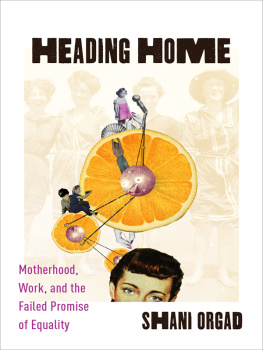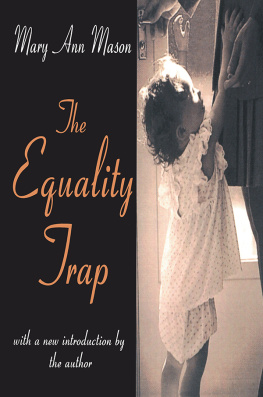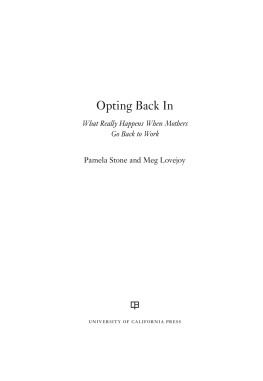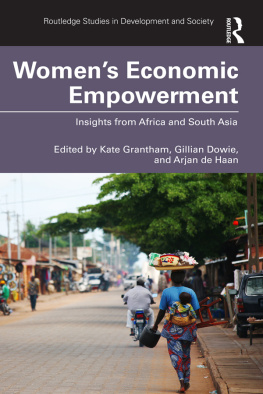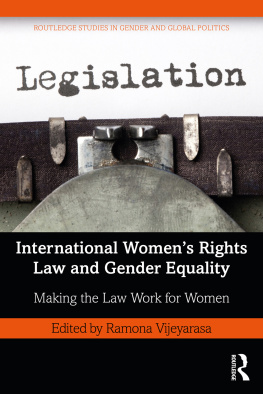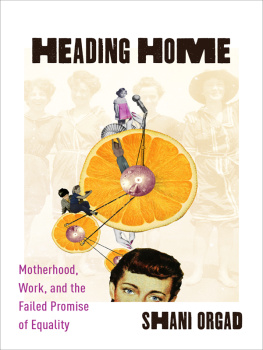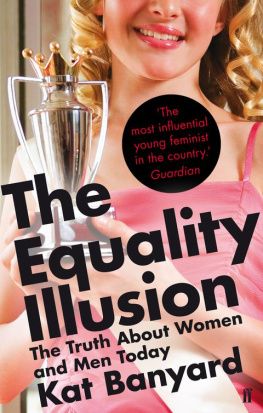Table of Contents
Columbia University Press
Publishers Since 1893
New York Chichester, West Sussex
cup.columbia.edu
Copyright 2019 Columbia University Press
All rights reserved
E-ISBN 978-0-231-54563-1
Library of Congress Cataloging-in-Publication Data
Names: Orgad, Shani, 1972- author.
Title: Heading home : motherhood, work, and the failed promise of equality / Shani Orgad.
Description: New York: Columbia University Press, [2019] | Includes bibliographical references and index.
Identifiers: LCCN 2018024035 (print) | LCCN 2018025997 (e-book) | ISBN 9780231545631 (e-book) | ISBN 9780231184724 (cloth : alk. paper)
Subjects: LCSH: Work and family. | Working mothers. | Stay-at-home mothers. | Women in the professions. | Women executives. | Sex discrimination in employment.
Classification: LCC HD4904.25 (e-book) | LCC HD4904.25 .O74 2019 (print) | DDC 331.4/4dc23
LC record available at https://lccn.loc.gov/2018024035
A Columbia University Press E-book.
CUP would be pleased to hear about your reading experience with this e-book at .
Cover design: Lisa Hamm
Cover illustration: Sharon Webber-Zvik, The Operator
Contents
T he two women I have been closest to in my life, my paternal grandmother and my mother, I have always known as both mothers and workers. My grandmother immigrated to Kibbutz Kinneret (in what is now northern Israel) from Zilupe, Latvia, in 1935, and as a Zionist kibbutz pioneer, worked alongside her male and female peers on road construction, in agriculture, and milking cows. It was precisely as she was milking cows while heavily pregnant that she began to have her first contractions, heralding the birth of her first child, my father. She continued to work for many years afterward, until the age of 79, as one of the kibbutzs clothes storage managers, as a cook in the communal kitchen, and later, as a packer in the kibbutzs date factory. She had four sons, who, from the day they were born, were all raised in the kibbutzs communal childrens houses. When my father and his brothers came to visit their parents in their small apartment, my grandmother would bake them their favorite cakes and biscuits, an act through which she expressed the immense pleasure and joy she took in motherhood (despite having always yearned for a daughter!). Although the different jobs she did throughout her lifetime were physically very demanding, she never complained. I have vivid memories of my grandmothers cheerful attitude and incredible energyof her rising at 5:30 every morning and working long hours, often in the scorching heat.
My own mother, who at the age of four had lost her mother, to this day takes pride in motherhood as being her number one occupation. She trained as a teacher, and after marrying my father, she moved with him to the kibbutz. Since there were no jobs for her as a teacher, she undertook whatever jobs were available. When I was born, my mother led a successful campaign to abolish the kibbutzs communal sleeping system, where the children slept in the childrens houses, which were monitored at night by rotating shifts of night watchmen and watchwomen who, using an intercom system, were supposed to locate and respond to the childrens nighttime needs. For my mother, the thought of not having her baby sleeping beside her was unbearable. Later, our family left the kibbutz and my parents divorced. Although she had trained as a teacher, my mother never worked in her profession. She had always worked in administrative and sales jobs that had kept her afloat financiallyand proved crucial following her divorce. Make sure you always have enough money of your own to enable you to stand on your two feet, she repeatedly urged me when I was a girl and later when I became a young woman.
My relationship to work and family has been shaped, deeply and profoundly, by these two dear women and the models of womanhood, work, and family they presented to me. It was also significantly shaped by the promises of the 1980s and early 1990s. As a teenager, the popular culture I consumed was heavily influenced by messages of girl power (Charlies Angels, Cyndi Lauper, Madonna, and Tina Turner posters were plastered all over my bedroom walls), and by depictions of empowered women who just do it in the spheres of both paid work and family (I remember enthusing about the films Working Girl and Baby Boom).
I started my first paid job in an advertising agency during the last year of my undergraduate studies, and I have been in paid employment ever since, including various part-time jobs during my masters and PhD studies, and the full-time academic employment I entered since completing my PhD in 2003. Like my grandmother, baking my two sons their favorite biscuits and cakes gives me immense pleasure, as do many other aspects of motherhood. Like my grandmother and my mother, for me being in employment was never a question. However, unlike them, with my mothers incredible support, I was fortunate that I could pursue a career in a profession I chose and about which I am passionate. Also unlike them, I do complain about work!
The women I interviewed for this book chose a path that is significantly different from mine: to leave paid employment and become stay-at-home mothers. However, there are also many commonalities between our experiences. Though I grew up in Israel and they grew up mostly in Britain, and some in the United States, Europe, and Latin America, we were exposed to similar messages and promises, and often to similar popular representations of femininity in the 1980s and 1990s. We belong to a generation that has experienced both the benefits and the fault lines of growing up in the wake of the feminist movement and the increasing dominance of neoliberalismwith the profound challenges and painful emotional injuries their imbrication has produced. This book tells the story of the conditions that have shaped these womensand to an extent their generationsexperience of family and work under neoliberal capitalism.
I am deeply indebted to the women and men who shared their intimate experiences with me. This book could not have been written without their generosity and candor.
I am also very grateful to several people who assisted with the research for this book. Sara De Benedictis provided invaluable research assistance at various stages and was a real pleasure to work with. Gillian Paull at Frontier Economics conducted a statistical analysis of the UK Labour Force Survey and generously shared her expertise on aspects of UK labor policy. Richard Stupart worked persistently to secure the copyrights for use of images for this book. I also thank James Deeley for administrative support during different stages of the research project, and to Hila Shkolnik-Brener and Eleanor Cartwright for their help with the books cover.
I want to express my gratitude to several people who read all or parts of the manuscript in draft form and offered constructive feedback. My heartfelt thanks go to Rosalind Gill for her insightful, inspiring, and generous feedback and continuous encouragement, and to Catherine Rottenberg for her detailed, incisive, and always encouraging and constructive comments. Special thanks go to Shai Aran, who read parts of the manuscript and gave excellent comments on both content and form. I owe thanks also to Nick Couldry and Jan Radway, and to the members of my book groupBart Cammaerts, Lilie Chouliaraki, Ellen Helsper, Sonia Livingstone, and Peter Lunt, who commented on chapter drafts.

